牛津译林版(2019)必修 第二册 Unit3 Reading2 教案
【牛津译林版】必修二:Unit3 Amazing people reading教案
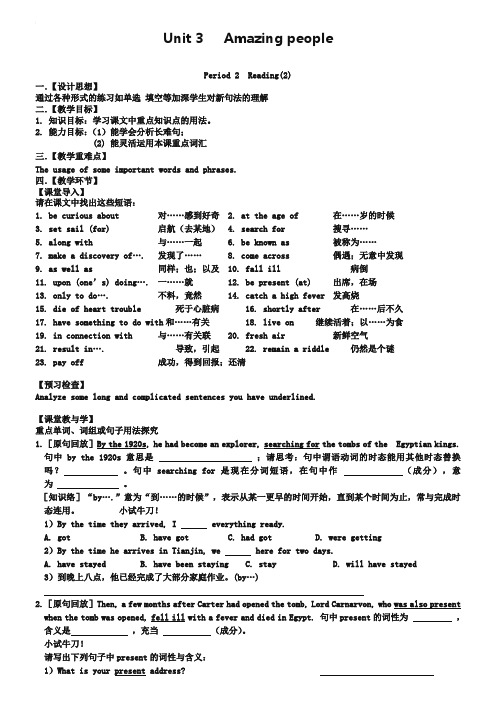
Unit 3 Amazing peoplePeriod 2 Reading(2)一.【设计思想】通过各种形式的练习如单选填空等加深学生对新句法的理解二.【教学目标】1. 知识目标:学习课文中重点知识点的用法。
2. 能力目标:(1)能学会分析长难句;(2) 能灵活运用本课重点词汇三.【教学重难点】The usage of some important words and phrases.四.【教学环节】【课堂导入】请在课文中找出这些短语:1. be curious about 对……感到好奇2. at the age of 在……岁的时候3. set sail (for) 启航(去某地)4. search for 搜寻……5. along with 与……一起6. be known as 被称为……7. make a discovery of…. 发现了……8. come across 偶遇;无意中发现9. as well as 同样;也;以及 10. fall ill 病倒11. upon (one’s) doing…. 一……就12. be present (at) 出席,在场13. only to do…. 不料,竟然14. catch a high fever 发高烧15. die of heart trouble 死于心脏病16. shortly after 在……后不久17. have something to do with和……有关18. live on 继续活着;以……为食19. in connection with 与……有关联20. fresh air 新鲜空气21. result in…. 导致,引起22. remain a riddle 仍然是个谜23. pay off 成功,得到回报;还清【预习检查】Analyze some long and complicated sentences you have underlined.【课堂教与学】重点单词、词组或句子用法探究1.[原句回放]By the 1920s, he had become an explorer, searching for the tombs of the Egyptian kings.句中by the 1920s 意思是;请思考:句中谓语动词的时态能用其他时态替换吗?。
牛津译林版高中英语必修二Unit 3《Amazing people》(reading)教案
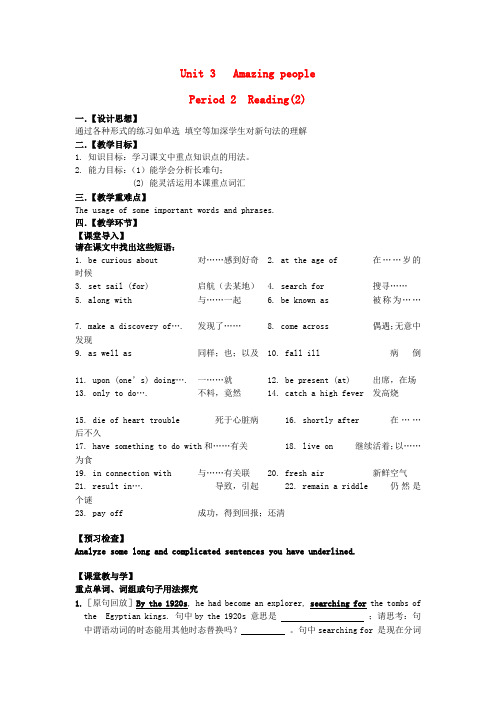
Unit 3 Amazing peoplePeriod 2 Reading(2)一.【设计思想】通过各种形式的练习如单选填空等加深学生对新句法的理解二.【教学目标】1. 知识目标:学习课文中重点知识点的用法。
2. 能力目标:(1)能学会分析长难句;(2) 能灵活运用本课重点词汇三.【教学重难点】The usage of some important words and phrases.四.【教学环节】【课堂导入】请在课文中找出这些短语:1. be curious about 对……感到好奇2. at the age of 在……岁的时候3. set sail (for) 启航(去某地)4. search for 搜寻……5. along with 与……一起6. be known as 被称为……7. make a discovery of…. 发现了……8. come across 偶遇;无意中发现9. as well as 同样;也;以及 10. fall ill 病倒11. upon (one’s) doing…. 一……就12. be present (at) 出席,在场13. only to do…. 不料,竟然14. catch a high fever 发高烧15. die of heart trouble 死于心脏病16. shortly after 在……后不久17. have something to do with和……有关18. live on 继续活着;以……为食19. in connection with 与……有关联20. fresh air 新鲜空气21. result in…. 导致,引起22. remain a riddle 仍然是个谜23. pay off 成功,得到回报;还清【预习检查】Analyze some long and complicated sentences you have underlined.【课堂教与学】重点单词、词组或句子用法探究1.[原句回放]By the 1920s, he had become an explorer, searching for the tombs of the Egyptian kings. 句中by the 1920s 意思是;请思考:句中谓语动词的时态能用其他时态替换吗?。
高中英语牛津译林版 必修第二册 Unit 3 reading 课件 (2)
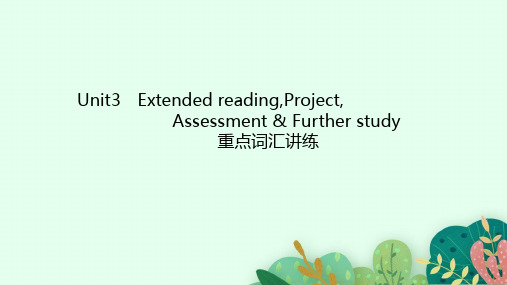
3.settle vi.& vt.定居;结束;解决;决定;使处于舒适的位置
【教材原句】 Luo Yan and his wife and son have settled in the big city,far
away from their hometown.
罗言和他的妻儿已经在大城市定居,离家乡很远。
4.convenient adj.方便的,省事的,便利的,实用的 【教材原句】 However,the high-speed train has made it much more
convenient for them to go back home. 不过,高铁让他们回家方便多了。 【归纳拓展】 it is convenient for sth.对某事来说方便 it is convenient for sb.to do sth.对某人来说做某事方便 convenience n.便利,方便;便利设施 for the convenience of为了……的方便 at one’s convenience在某人方便之时
garbage.
②Equally attractive are all sorts of sports and cultural events.
③The result of the meeting was sort of encouraging.
完成句子·背诵
④临床心理学教授Mitch Prinstein把它分成两类。
Unit3 Extended reading,Project, Assessment & Further study 重点词汇讲练
重点词汇
1.sort n.种类,类别 vt.整理,分类;妥善处理 【教材原句】 It is just past five o’clock on the Chinese New Year’s Eve,and the dinner table is already covered with white china plates and bowls,full of all sorts of dishes:chicken,duck,pork,fish and vegetables. 除夕刚过五点钟,饭桌上已经摆满了白瓷碗碟,里面装着各色菜肴:鸡鸭鱼 肉和蔬菜。
英语必修2译林牛津版Unit 3reading

Module Two Unit Three Amazing PeopleReading The curse of the mummy Teaching contents:Reading——The curse of the mummyTeaching Objectives:Knowledge and skills:1. Develop Ss’ ability of predicting information.2. Train students' reading ability.3. Help the students have a better understanding of the text.Process and methods:1.Questions-and-answer activity to check students’ understanding of the text.2.Individual, pair or group work to make every student work in class.3.Skimming, scanning, listening and careful reading.4.Discussion to help students understand better what they have learned. Emotion, attitude and values:1.Develop the students’ desire for exploring, the qualities of courage, cooperation, confidence and so on.2.Provide chances for students to increase their knowledge of history. Teaching Important Points:1. Improve the students’ reading ability.2. Enable the students understand the text better.3. Develop the students’ creative, comprehensive and consolidating abilities. Teaching Difficult Points:1. How to make the students understand the passage better.2. How to help the students develop their reading comprehension abilities. Teaching Aids:The multimedia, the blackboardTeaching procedures:Step 1 Lead-in1. What do you think of when you talk about Egypt?Picture showing: (the River Nile, Pyramids and Sphinx)2. Have you ever read or thought about what is inside the pyramids?Picture showing: (treasures and mummies)3. Explanation of curse.Today we’ll come to the reading part: the curse of the mummy.How do you understand the title?What does the ‘curse’ mean?(Curse: words believed to have magical powers that can harm people)Step 2 Reading strategy1.Skills learningAsk students to go through the reading strategy.How can we predict information in an article?1) the title (too general)2) the first paragraph (more specific)(It usually tells us what the passage will be about. We should look for the key words when we read it. These may help us prepare for and predict what will come next.)2.PracticePredicting information of the text.1) by reading the titleWhat might be the connections between ‘The curse of the mummy’ and the famous explorer?Why does the writer choose ‘The curse of the mummy’ as the title?From your point of view, what might be talked about in the article?2) by reading the first paragraphWhat’s the first paragraph about?(An introduction to Howard Carter.)Can you predict what the following paragraphs will tell us?A. Carter’s hobbiesB. Carter made some unexpected discoveriesC. Carter’s familyD. Carter’s school lifeStep 3 Reading Comprehension1.Fast reading1) Scan the article and the answer the questions.What amazing discovery did Howard Cater make?(He found the tomb of King Tutankhamun.)Wha t happened to some of Carter’s team members after the tomb was opened? (They fell ill and died.)2)Skim the article and finish part C2.a.There is a scientific reason why people died after entering the tomb.b.Howard Carter did not go to school and later became an explorer.c.Lord Carnarvon died after visiting the tomb.d.Howard Carter discovered the tomb of King Tutankhamun.e.Howard Carter is a world-famous explorer.f.The ‘curse of the mummy’ remains a mystery.g.More people died after Carter’s discovery.h.People keep wondering why so many people died and have suggested allkinds of explanation.Paragraph 1 e Paragraph 2 bParagraph 3 d Paragraph 4 cParagraph 5 g Paragraph 6 hParagraph 7 a Paragraph 8 f2.Carful reading1)Divide the passage into four parts.Part 1 (para 1) A short introduction to Howard Carter.Part 2 (para 2-3) More information about Carter.Part 3 (para 4-5) Some people died after the tomb was opened.Part 4 (para 6-8) Different explanations, but no conclusion.2)Read 1-3 paragraph carefully and find out more information about HowardCarter.Education: learnt to draw from his fatherInterest: loved to visit and explore new placesWent to Egypt: in 1891, at the age of 17Job: explorer (by the 1920s)Discoveries: many amazing thingsGreatest discovery: King Tutankhamun’s tombWhere and when: in the Valley of the Kings, in Egypt, in 19223) ListeningListen to 4-5 paragraph and finish the following chart:4) Read 6-8 paragraph carefully and find out:What are the different explanations of the deaths?Some people say: coincidenceOthers believe that : in connection with a mummy’s curseHowever, still others believe: a scientific explanation----virusesStep 4 ConsolidationFill in the blanks according to the article.Howard Carter is one of the most famous explorers the world has ever known. Hewas bright and curious about the world outside his hometown when he was very young. By the 1920s, he had become an explorer, searching for the tombs of the Egyptian kings. In 1922, Howard Carter made his most amazing discovery of all, in the Valley of the Kings, in Egypt, where he came across the tomb of King Tutankhamun.However, not lo ng after the tomb had been opened, people in Carter’s team began to fall ill and die. Within seven years, 21 people who had something to do with the opening of the tomb died. Some people say the deaths were just coincidence. Others believe that they were in connection with a mummy’s curse. However, still others believe that there is a scientific explanation, because inside the tombs there are many viruses.Step 5 DiscussionAsk students to work in pairs and have a discussion:1. What kind of personality should an explorer like Carter has to have?2. As for students, what kinds of personalities should we have?Step 6 Assignments:1. Finish part E on page 45.2. Read part A on Page 106 in Workbook.3. Write a summary about Howard Carter.。
牛津译林版高中英语必修二 Unit 3 reading 2 导学案
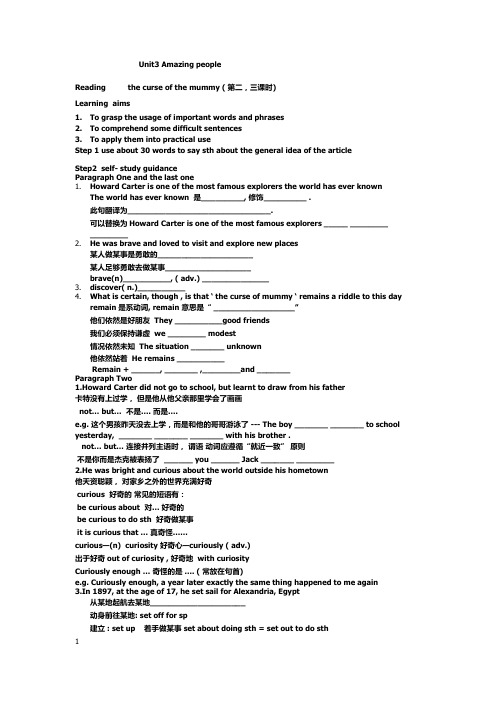
Unit3 Amazing peopleReading the curse of the mummy ( 第二,三课时)Learning aims1.To grasp the usage of important words and phrases2.To comprehend some difficult sentences3.To apply them into practical useStep 1 use about 30 words to say sth about the general idea of the articleStep2 self- study guidanceParagraph One and the last one1.Howard Carter is one of the most famous explorers the world has ever knownThe world has ever known 是_________, 修饰_________ .此句翻译为______________________________.可以替换为Howard Carter is one of the most famous explorers _____ ________ ________2.He was brave and loved to visit and explore new places某人做某事是勇敢的____________________某人足够勇敢去做某事__________________brave(n)__________, ( adv.) ______________3.discover( n.)__________4.What is certain, though , is that ‗ the curse of mummy ‗ remains a riddle to this dayremain是系动词, remain 意思是“ _________________‖他们依然是好朋友 They __________good friends我们必须保持谦虚 we ________ modest情况依然未知 The situation _______ unknown他依然站着 He remains __________Remain + ______, _______ ,________and _______Paragraph Two1.Howard Carter did not go to school, but learnt to draw from his father卡特没有上过学,但是他从他父亲那里学会了画画n ot… but…不是…. 而是….e.g. 这个男孩昨天没去上学,而是和他的哥哥游泳了 --- The boy _______ _______ to school yesterday, _______ _______ _______ with his brother .not… but…连接并列主语时,谓语动词应遵循“就近一致”原则不是你而是杰克被表扬了 ______ you ______ Jack _______ ________2.He was bright and curious about the world outside his hometown他天资聪颖,对家乡之外的世界充满好奇curious 好奇的常见的短语有:be curious about 对…好奇的be curious to do sth 好奇做某事it is curious that …真奇怪……curious—(n) curiosity 好奇心—curiously ( adv.)出于好奇 out of curiosity , 好奇地 with curiosityCuriously enough …奇怪的是…. ( 常放在句首)e.g. Curiously enough, a year later exactly the same thing happened to me again3.In 1897, at the age of 17, he set sail for Alexandria, Egypt从某地起航去某地____________________动身前往某地: set off for sp建立 : set up 着手做某事 set about doing sth = set out to do sth以…为背景 be set in ..4.By the 1920s, he had become an explorer, searching for the tombs of Egyptian kingsBy( the time ), ―到…为止“后面接一个表示过去的时间,则主句通常用______ 时态当主句有be 动词时,一般不用完成时By midnight yesterday, the patient _______( be) dead当by 后面接一个将来的时间,则主句用将来完成时e.g. we ____________( learn) 1800 words by the end of this term当 by 后面接一个现在的时间,则主句用现在完成时e.g. Mike __________ ( make) some friends in his new school by now5. inside the tomb, he discovered a great fortune in jewels and gold, along with the preserved bodies of dead kings(a), fortune, 财富,大笔的钱,运气,命运You are the master of your own fortune ( 翻译) ______________________make a fortune 发财 seek one‘s fortune 谋求出路tell sb‘s fortune 给某人算命have the good/ bad fortune to do sth 有幸/不幸做某事,fortunate ( adj.) 幸运的—unfortunate ( adj.) _________fortunately (adv.) ___________ unfortunately ( adv.) ____________(b) along with sth 意思是_________________Mary along with her several friends _______ ( be) singing in the room即:当along with, as well as , with , together with, 等连接两个名词或代词做主语时,谓语与前一个主语保持一致(c )preserve ( 动)保存,保护,维护,保鲜(名)专门领域Preserve sb/ sth from doing sth 保护…免于…… = Protect … from…We should take measures to _______________________( 保护环境免受污染)be well preserved 保存得好 preserved fruit 防腐水果preserve—( 名词) preservation警察负责维护治安 the police are responsible for the _______________ of law and order5.These preserved bodies are known as mummiesbe known as 作为…而出名(后面接表示身份的名词)be known to 为…所熟知( to是介词,表示为谁所知)be known for 因…而出名(介词for后加出名的原因)e.g. The train passes by Guilin, which is well known ____ its lovely scenery A. as B. for C. to D. by ( well 修饰known)Paragraph Three1.In 1922, Howard Carter made his most amazing discovery of allDiscover vt. 发现, discoverer n. 发现者 discovery n.发现Make a discovery of ……发现了…..Columbus was a great discover and he discovered America in 1492. It is said that his discovery took place by accident /by chance / by coincidence2.They came across the tomb of King Tutankhamun.Come across (偶然)遇到,发现Come up with 想出,提出Come about 发生Come to oneself 苏醒,恢复知觉Come out 出版,出现,结果是3.as well as 和…一样好,也,和mother , as well as her children, was invited to the party( as well as 连接两个名词做主语时,谓语动词与前面的名词保持一致)4.Afterwards , all of its contents would go into a museumContent, 内容,目录,容量,含量e.g. 我读书总是先从目录看起 I always read _____________ first of all橘子的维生素含量很高 oranges have a high _____________Content 形容词,满足的,常用短语: be content with …译为“对…满足”be content to do sth 对做某事感到满足,愿意做某事e.g. 你对你的工作满意么? _______ you _______ _________ your work?她安静地坐着,心满意足地看他干活?She sat quietly, ______ ______ ______ him workingContent, 动词,译为“使满足” content oneself with sth 使自己对…感到满足e.g. 那个小孩有了新玩具就满足了The kid ________ ________ _______a new toyParagraph Four1.People in Carter‘s team began to fall ill and dieFall ill 病了, fall asleep 入睡 fall behind 落后 fall over 跌倒Fall off 下降,跌落 fall into the habit of 养成某种习惯Fall in love with …爱上某人2.Upon their entering the tomb, Carter‘s lucky pet bird, which he had left in Cairo , wasswallowed by a snake(a) On/Upon doing sth / upon sth 一…就…= as soon as …e.g. As soon as my mother arrived home , my mother started cooking= ________ ________ home , my mother started cooking动名词或名词的逻辑主语与句子的主语为同一个,As soon as Tom arrived at home , my mother started cooking= ______ Tom‘s _______ at home , my mother started cooking当主语不一致时,用名词所有格As soon as she heard the news, she burst into tears=_______ _______ she heard the news , she burst into tears= ________ hearing the news, she burst into tears= ________ she heard the news, she burst into tearsWe had hardly got there when it began to rain (主从句主语不同)= hardly had we got there when it began to rain= no sooner had we got there when it began to rain= As soon as we got there , it began to rain( as soon as + 句子一…. 就…..= immediately / directly / instantly + 句子=the minute/moment /second/ instant+ 句子= upon/on doing sth )=…hardly/scarcely … when …. 一…就…( hardly, scarcely 放句首倒装)=… no sooner … than …一…就… (no sooner 放在句首要倒装)(b) swallow vt. Vi. 吞下,吞咽 chew 意思“咀嚼” digest 意思“消化”Swallow up 吞没,(企业)吞并,湮没简很快被淹没在人群中Jane ______ _______ ______ in the crowdSome books are to be tasted , others to be swallowed , and some few to be chewed and digested ( Bacon)( 书籍好比食物) 一些书只是浅尝辄止,一些书该囫囵吞枣,而有些书需要细嚼慢咽,好好消化(培根)3.Lord Carnarvon, who was also present when the tomb was opened, fell ill with a feverand died in Egypt.1.He too visited the tomb, only to catch a high fever the next day本句为简单句,句中“ only to do…‖作结果状语译为”不料…, 竟然…―往往表示出乎预料或不想要的结果我到了商店,结果发现我把钱落在家里了I arrived at the shop, ______ _______ _______ I have left all my money at home2.die of …. 死于饥饿,衰老或感情造成的死亡die from …如果有事故,环境造成的间接死亡,比如:枪伤,虚弱,过度劳累,饮食过度,空气污染die for …为…而死,为…而献身die off 相继死去(不接宾语)die down ( 火) 逐渐变弱;(骚动)等渐渐平息die away 逐渐减弱,逐渐消失(尤指声音渐渐消失)die out 灭绝,消失Paragraph Six1.within seven years, 21 people who had something to do with the opening of thetomb died(a)have something to do with sth 与……有关have nothing to do with 与…. 无关have much to do with 与…有很大关系have a lot to do with 与…有很大关系have a great deal to do with 与…有很大关系have little to do with …. 与…. 关系不大(b)within ( prep.) 在…之内,不超过within reach of 在…附近within one‘s reach 在某人够得到的范围之内within /in / during 区别in + 段时间,表示多久之后,常与将来时连用after + 段时间,表示多久之后,常与过去时连用within 既可以指时间范围内,也可以空间范围内during 只指时间内,在…. 期间2.Howard Carter, however, lived on until the age of 65However, 意思是“然而,不过”(副词)常与逗号与句子隔开However , 意思是“不管多么,无论到什么程度”与形容词,副词连用,引导让步状语从句不管天有多冷,他总是去游泳_______ ______ it is , he always _______ __________3.some people say the deaths were just coincidence. Others believe that they were in connection with a mummy‘s curse. As a punishment for those who enter the resting place of the dead(a) coincidence, (n.) 巧合,碰巧, ( 思想,观点等) 一致,相符Coincident ( adj.)by coincidence 碰巧 by chance= by accident 偶然地,无意地pure coincidence 纯属巧合what a coincidence it is to do …. 做…真是太巧了it is a coincidence that ………是个巧合(从句常用should 表示惊讶)e.g. 他的观点和你自己的有一致之处there is _______ ________ between his opinion and your own(b )connection (两个事实,观点,事件之间的)联系,关联in connection with 与…. 有关have a /no connection with sth 和某事有/ 没有关系(C ) punishment 惩罚/ argument争吵/ development 发展/ agreement同意 / encouragement 鼓励/ movement 移动Paragraph Seven1, scientist 科学家– scientific 科学的– science 科学2 when the tomb is opened , fresh air disturbs the virusesdisturb, (vt.)打扰,扰乱 disturbing ( adj.) 令人不安的disturbed ( adj.) 心烦意乱的,心神不宁的don‘t disturb them when they are working状语从句的省略(a) if they are breathed in , they can result in illness or even death在含有时间,条件,让步状语从句的主从复合句中,如果从句的主语和主句的主语相同,或者从句的主语为 It,且从句中含有be 动词,可以省略从句中的主语和Be动词,从而构成连词+ ving / V –ed/ adj. 主动用doing , 被动用done. 不满足这样条件,不能省略。
译林版高中英语必修二Unit 3 Reading (II) 教案
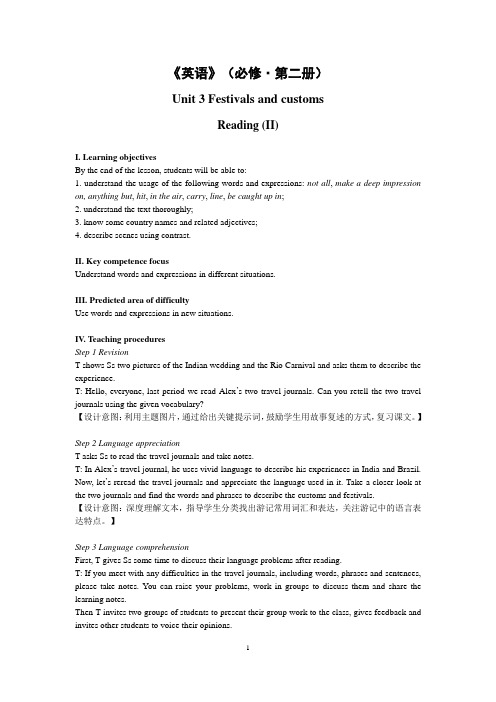
《英语》(必修·第二册)Unit 3 Festivals and customsReading (II)I. Learning objectivesBy the end of the lesson, students will be able to:1. understand the usage of the following words and expressions: not all, make a deep impression on, anything but, hit, in the air, carry, line, be caught up in;2. understand the text thoroughly;3. know some country names and related adjectives;4. describe scenes using contrast.II. Key competence focusUnderstand words and expressions in different situations.III. Predicted area of difficultyUse words and expressions in new situations.IV. Teaching proceduresStep 1 RevisionT shows Ss two pictures of the Indian wedding and the Rio Carnival and asks them to describe the experience.T: Hello, everyone, last period we read Alex’s two travel journals. Can you retell the two travel journals using the given vocabulary?【设计意图:利用主题图片,通过给出关键提示词,鼓励学生用故事复述的方式,复习课文。
牛津译林版高中英语必修二《Unit 3 Amazing people》Reading 教学设计2
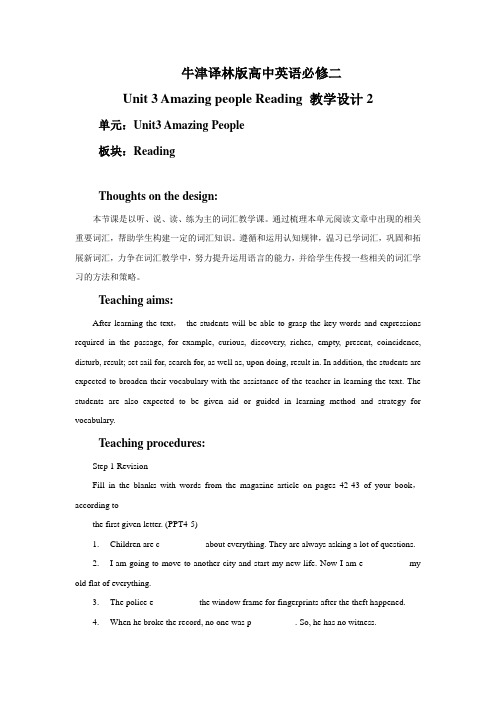
牛津译林版高中英语必修二Unit 3 Amazing people Reading 教学设计2 单元:Unit3 Amazing People板块:ReadingThoughts on the design:本节课是以听、说、读、练为主的词汇教学课。
通过梳理本单元阅读文章中出现的相关重要词汇,帮助学生构建一定的词汇知识。
遵循和运用认知规律,温习已学词汇,巩固和拓展新词汇,力争在词汇教学中,努力提升运用语言的能力,并给学生传授一些相关的词汇学习的方法和策略。
Teaching aims:After learning the text,the students will be able to grasp the key words and expressions required in the passage, for example, curious, discovery, riches, empty, present, coincidence, disturb, result; set sail for, search for, as well as, upon doing, result in. In addition, the students are expected to broaden their vocabulary with the assistance of the teacher in learning the text. The students are also expected to be given aid or guided in learning method and strategy for vocabulary.Teaching procedures:Step 1 RevisionFill in the blanks with words from the magazine article on pages 42-43 of your book,according tothe first given letter. (PPT4-5)1. Children are c__________ about everything. They are always asking a lot of questions.2. I am going to move to another city and start my new life. Now I am e__________ my old flat of everything.3. The police e__________ the window frame for fingerprints after the theft happened.4. When he broke the record, no one was p__________. So, he has no witness.5. There are many well-p__________ old buildings in this small town. These buildings attract a lot of visitors every year.6. This man spent all of his life sailing across the oceans. Can you imagine living such an a__________ life?7. Don't d__________ her; she is doing her homework.8. The d__________ of gold in California made people rush to the west.9. What a c__________ that we meet in Paris!10. The Great London Fire, which began on 2nd September 1666, r__________ in huge damage to the city of London.(Keys: curious;emptying;examined;present;preserved;adventurous;disturb;discovery;coincidence;resulted)[Explanation]通过巩固练习,复习阅读中的主要词汇。
牛津译林版(2019)必修 第二册 Unit2 Extended reading 教案
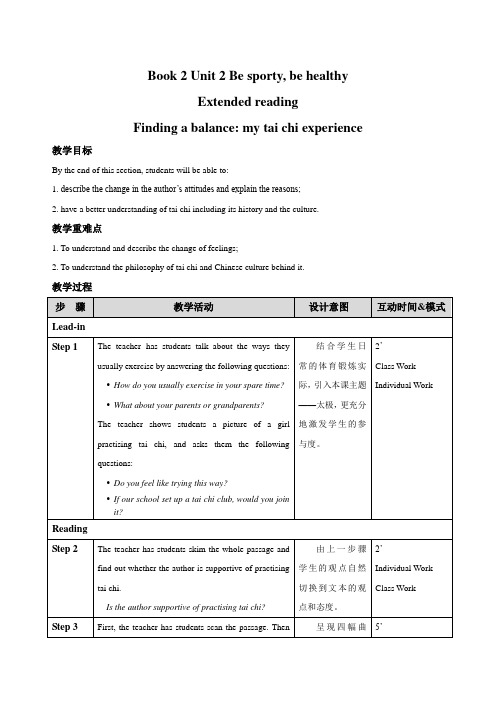
Book 2 Unit 2 Be sporty, be healthyExtended readingFinding a balance: my tai chi experience 教学目标By the end of this section, students will be able to:1. describe the change in the author’s attitudes and explain the reasons;2. have a better understanding of tai chi including its history and the culture.教学重难点1. To understand and describe the change of feelings;2. To understand the philosophy of tai chi and Chinese culture behind it.教学过程he/she provides them with some graphs and has them choose the one that best describes the change in the author’s attitudes.Sample answer: D. 线图,让学生阅读文本,并选择最能表达作者兴趣变化的一幅,把抽象的心态具象化。
Individual WorkClass WorkStep 4 The teacher has students read the passage again. Then encourages students to find out an adjective to reflectthe author’s attitudes in different periods with the helpof Graph D and give reasons.Sample answer:The first adjective is “hesitant”. At the ver ybeginning, when the author was suggested by herfriend joining the Tai Chi Club, he believed it wasfor old people. Then he felt “amazed” because hefelt tai chi classes were fun and easy, not like whathe had thought before. The third one is “bored”.After learning the basics of tai chi in those first few通过让学生寻找形容词,引导学生在文中定位相关信息,将作者的心态变化自然而然地分为几个阶段,更好地描述作者的心态转变过程。
- 1、下载文档前请自行甄别文档内容的完整性,平台不提供额外的编辑、内容补充、找答案等附加服务。
- 2、"仅部分预览"的文档,不可在线预览部分如存在完整性等问题,可反馈申请退款(可完整预览的文档不适用该条件!)。
- 3、如文档侵犯您的权益,请联系客服反馈,我们会尽快为您处理(人工客服工作时间:9:00-18:30)。
步骤
教学活动
设计意图
互动时间&模式
Revision
Step 1
The teacher invites students to go through the two travel journals quickly and think about the following question.
Besides weddings and festivals, what other elements are n important part of a country’s customs and traditions?
(3)Why did the author say “I have two left feet …and both of them hurt”?
The teacher encourages students to think carefully and guides them toexpresstheir understandings.
2’
(3)I have two left feet … and both of them hurt!
Students are invited to locate these in the journal and read them carefully by themselves and answer the following questions.
(4) I was so caught up in the partyfeverthat I hardly noticed five hours fly by!
Students are invited to locate these in the journal and read them carefully by themselves and answer the following questions.
Book 2 Unit3 Festivals and customs
Reading 2
Alex around the world
教学目标
By the end of this section, students will be able to:
1. understand and appreciate the difficult sentences in the travel journals;
借助词典,查找与国家名词相关的形容词,结合练习,拓展词汇。
5’
Group work
Individual work
Homework
Read the travel journals again and finish Exercises A, B and D on Pages 69–70 in the workbook.
The teacher presents the words and phrases related to the sea andlets students feel theatmospherewith the metaphor.
The teacher encourages students to use a group of wordsrelatedto a topic to describe their experience at a festival. Before students start out,the teacher presents a sample.
(1)Why did the author think “it would be the opportunity of a lifetime”?
(2)How do you understand the sentence “The customs that followed were anything but ordinary”?
在学生理解文本表层信息后,帮助学生深入挖掘文本,理解文本中的难点及深层涵义,通过启发性的设问开展有效的阅读和思维训练活动,关注语言、内容和思维的统一,提升学生的语言能力和思维能力。
12’
Individual work
Group work
Step 3
The teacher presents some sentences with some highlighted phrases on PPT:
(4)What does the “fever” mean here?
12’
Group work
Individual work
Application
Step 4
The teacher has students read the introduction to La Tomatina on Page 33 and makessurethat students understand the words and phrases in the box and their usages before putting them in the correct blanks. Then students complete it with the correct forms of the words and phrases in the box.
掌握文本中的暗喻手法,感受暗喻在描述中的作用,结合自身经验,运用暗喻这一修辞手法进行描述。
8’
Group work
Individual work
Extension
Step 6
The teacher presents some countries and several related adjectives with most missing in a table on PPT and encourages students to refer to the dictionaries and fill the adjectives in.
Appreciation
Step 2
The teacher presents some phrases and sentences on PPT:
(1)…it would be the opportunity of a lifetime.
(2)The customs that followed were anything but ordinary.
(1)Why did the author say “No wonder”? What does the author want to show?
(2)What is “the spirit of Carnival”?
(3)With the two phrases used here, what does the author want to show?
Students discuss in groups while making a list and then describe one after another.
通过设问,让学生回顾文本,内化所学,在此基础上延伸拓展,迁移创新语言能力,提升思维品质。
6’
Individual work
Group work
通过对文本中所学的重点和难点进行操练,完成语言知识的运用和巩固。
5’
Individual work
Step 5
The teacher tells students that the travel journal describing Alex’s experience at the Rio Carnival uses a group of words related to thesea. Thenthe teacher encourages students to find them out and read them bythemselvesin silence.
(1)No wonderpeople from Rio take a week off for this happy occasion.
(2) To experiencethe spirit of the Carnivalfor myself, I went to a street party.
(3)Then there wasan explosion ofbrightcolours and lively music, and the groupjumped into action.
教学重难点
1.To understand and appreciate the difficult sentences;
2. To use the new words and expressions appropriately;
3.Toexplore the functionsof metaphors and apply metaphors correctly.
2. use new words and expressions in appropriate situations;
3. explore the metaphors and apply metaphors correctly;
4. extend their vocabulary of countries.
